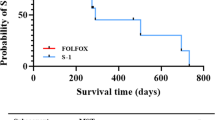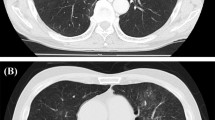Abstract
Background
Drug-induced interstitial lung disease (ILD) is one of the most serious adverse events with a high mortality rate and represents a serious clinical problem. However, gemcitabine plus nab-paclitaxel (GnP)-induced ILD in pancreatic cancer (PC) patients has not been thoroughly investigated. Therefore, we conducted this study to examine the clinical characteristics of GnP-induced ILD and identify risk factors for developing ILD.
Methods
We retrospectively investigated consecutive patients with PC who received GnP between January 2015 and April 2020. We compared the clinical characteristics and overall survival (OS) according to ILD occurrence and explored risk factors including ABO blood type for developing ILD.
Results
Of the 910 patients included in this study, ILD occurred in 20 patients (2.2%). PC patients who developed ILD had a significantly higher frequency of blood type B compared to those without ILD (42% vs. 22%, p ˂ 0.05). Other baseline characteristics including smoking history and current/previous lung disease were not different between the two groups. Median time from initiation of GnP to onset of ILD was 80 days. All patients recovered from ILD and OS was not significantly different according to ILD occurrence. Multivariate analysis revealed that blood type B was an independent risk factor for developing ILD.
Conclusions
We demonstrated that GnP-induced ILD occurred in 2.2% of PC patients with no mortality and OS did not differ according to ILD occurrence. Furthermore, we clarified that ABO blood type B was an independent risk factor for developing ILD in PC patients receiving GnP.


Similar content being viewed by others
Abbreviations
- PC:
-
Pancreatic cancer
- GnP:
-
Gemcitabine plus nab-paclitaxel
- ECOG:
-
Eastern Cooperative Oncology Group
- PS:
-
Performance status
- ILD:
-
Interstitial lung disease
- COPD:
-
Chronic obstructive pulmonary disease
- OS:
-
Overall survival
- TTF:
-
Time to treatment failure
- OR:
-
Odds ratio
- CI:
-
Confidence interval
References
Siegel RL, Miller KD, Jemal A (2020) Cancer statistics. CA Cancer J Clin 70(1):7–30
Von Hoff DD, Ervin T, Arena FP et al (2013) Increased survival in pancreatic cancer with nab-paclitaxel plus gemcitabine. N Engl J Med 369(18):1691–1703
Conroy T, Desseigne F, Ychou M et al (2011) FOLFIRINOX versus gemcitabine for metastatic pancreatic cancer. N Engl J Med 364(19):1817–1825
Barenboim A, Lahat G, Geva R et al (2018) Neoadjuvant FOLFIRINOX for locally advanced and borderline resectable pancreatic cancer: an intention to treat analysis. Eur J Surg Oncol 44(10):1619–1623
Hackert T, Sachsenmaier M, Hinz U et al (2016) Locally advanced pancreatic cancer: neoadjuvant therapy with folfirinox results in resectability in 60% of the patients. Ann Surg 264(3):457–463
Ielpo B, Duran H, Diaz E et al (2016) Preoperative treatment with gemcitabine plus nab-paclitaxel is a safe and effective chemotherapy for pancreatic adenocarcinoma. Eur J Surg Oncol 42(9):1394–1400
Philip PA, Lacy J, Portales F et al (2020) Nab-paclitaxel plus gemcitabine in patients with locally advanced pancreatic cancer (LAPACT): a multicentre, open-label phase 2 study. Lancet Gastroenterol Hepatol 5(3):285–294
Suker M, Beumer BR, Sadot E et al (2016) FOLFIRINOX for locally advanced pancreatic cancer: a systematic review and patient-level meta-analysis. Lancet Oncol 17(6):801–810
Hamada T, Yasunaga H, Nakai Y et al (2016) Interstitial lung disease associated with gemcitabine: a Japanese retrospective cohort study. Respirology 21(2):338–343
Furuse J, Gemma A, Ichikawa W et al (2017) Postmarketing surveillance study of erlotinib plus gemcitabine for pancreatic cancer in Japan: POLARIS final analysis. Jpn J Clin Oncol 47(9):832–839
Gemma A, Kudoh S, Ando M et al (2014) Final safety and efficacy of erlotinib in the phase 4 POLARSTAR surveillance study of 10 708 Japanese patients with non-small-cell lung cancer. Cancer Sci 105(12):1584–1590
Moore MJ, Goldstein D, Hamm J et al (2007) Erlotinib plus gemcitabine compared with gemcitabine alone in patients with advanced pancreatic cancer: a phase III trial of the National Cancer Institute of Canada Clinical Trials Group. J Clin Oncol 25(15):1960–1966
Okusaka T, Furuse J, Funakoshi A et al (2011) Phase II study of erlotinib plus gemcitabine in Japanese patients with unresectable pancreatic cancer. Cancer Sci 102(2):425–431
Nishimura M, Toyoda M, Takenaka K et al (2016) The combination of HLA-B*15:01 and DRB1*15:01 is associated with gemcitabine plus erlotinib-induced interstitial lung disease in patients with advanced pancreatic cancer. Cancer Chemother Pharmacol 77(6):1165–1170
Udagawa C, Horinouchi H, Shiraishi K et al (2019) Whole genome sequencing to identify predictive markers for the risk of drug-induced interstitial lung disease. PLoS ONE 14(10):e0223371
Li Y, Liu L, Huang Y et al (2020) Association of ABO polymorphisms and pancreatic cancer/cardiocerebrovascular disease: a meta-analysis. BMC Med Genet 21(1):41
Xu HL, Cheng JR, Zhang W et al (2014) Re-evaluation of ABO gene polymorphisms detected in a genome-wide association study and risk of pancreatic ductal adenocarcinoma in a Chinese population. Chin J Cancer 33(2):68–73
Kanda Y (2013) Investigation of the freely available easy-to-use software ‘EZR’ for medical statistics. Bone Marrow Transplant 48(3):452–458
Ioka T, Katayama K, Tanaka S et al (2013) Safety and effectiveness of gemcitabine in 855 patients with pancreatic cancer under Japanese clinical practice based on post-marketing surveillance in Japan. Jpn J Clin Oncol 43(2):139–145
Ogawa Y, Suzuki E, Mikata R et al (2018) Five cases of interstitial pneumonitis due to gemcitabine and nab-paclitaxel combination treatment in pancreatic cancer patients. Pancreas 47(7):e42–e43
Irie H, Suzuki R, Takagi T et al (2020) Interstitial lung disease in advanced pancreatic ductal adenocarcinoma patients treated with gemcitabine and nab-paclitaxel combination therapy: a retrospective analysis. Cancer Chemother Pharmacol 85(3):517–523
Kashiwada T, Saito Y, Terasaki Y et al (2019) Interstitial lung disease associated with nanoparticle albumin-bound paclitaxel treatment in patients with lung cancer. Jpn J Clin Oncol 49(2):165–173
Amundadottir L, Kraft P, Stolzenberg-Solomon RZ et al (2009) Genome-wide association study identifies variants in the ABO locus associated with susceptibility to pancreatic cancer. Nat Genet 41(9):986–990
Li SS, Zhou CY, Liao R et al (2020) ABO blood type, smoking status, other risk factors and prognosis of pancreatic ductal adenocarcinoma. Medicine (Baltimore) 99(14):e19413
Zhang BL, He N, Huang YB et al (2014) ABO blood groups and risk of cancer: a systematic review and meta-analysis. Asian Pac J Cancer Prev 15(11):4643–4650
Duan YF, Zhu F, Li XD et al (2015) Association between ABO gene polymorphism (rs505922) and cancer risk: a meta-analysis. Tumour Biol 36(7):5081–5087
Melzer D, Perry JR, Hernandez D et al (2008) A genome-wide association study identifies protein quantitative trait loci (pQTLs). PLoS Genet 4(5):e1000072
Paré G, Chasman DI, Kellogg M et al (2008) Novel association of ABO histo-blood group antigen with soluble ICAM-1: results of a genome-wide association study of 6,578 women. PLoS Genet 4(7):e1000118
Barbalic M, Dupuis J, Dehghan A et al (2010) Large-scale genomic studies reveal central role of ABO in sP-selectin and sICAM-1 levels. Hum Mol Genet 19(9):1863–1872
Qi L, Cornelis MC, Kraft P et al (2010) Genetic variants in ABO blood group region, plasma soluble E-selectin levels and risk of type 2 diabetes. Hum Mol Genet 19(9):1856–1862
Acknowledgements
We have no funds and grants in this study.
Author information
Authors and Affiliations
Contributions
Study Concept and Design: TT, TS, NS. Acquisition of Data: all authors. Analysis and interpretation of data: TT, TS, NS. Drafting of the article: TT. Critical revision of the article for important intellectual content: all authors. Final approval of the article: all authors.
Corresponding author
Ethics declarations
Conflict of interest
All authors declare no conflicts of interests for this article. Conflicts of interests outside this work are as follows; Naoki Sasahira received research funding from Zeria, Eisai, Kyowa Hakko Kirin, Baxalta and Taiho Pharmaceutical. Masato Ozaka received honoraria from Taiho Pharmaceutical, Yakult, Bayer, Pfizer, Novartis, Takeda Pharmaceutical Company Limited, Eisai, EA pharma and Mitsubishi Tanabe Pharma Corporation and research funding from Merck & Co., Inc., Incyte, ASLAN Pharmaceuticals, Taiho Pharmaceutical and Yakult. Takashi Sasaki received honoraria from Taiho Pharmaceutical and Eisai.
Ethics approval
This study was approved by the ethics committee of our institution (Institutional Review Board number: 2020-1041).
Additional information
Publisher's Note
Springer Nature remains neutral with regard to jurisdictional claims in published maps and institutional affiliations.
About this article
Cite this article
Takeda, T., Sasaki, T., Fukuda, K. et al. Risk factors for gemcitabine plus nab-paclitaxel-induced interstitial lung disease in pancreatic cancer patients. Int J Clin Oncol 26, 543–551 (2021). https://doi.org/10.1007/s10147-020-01827-2
Received:
Accepted:
Published:
Issue Date:
DOI: https://doi.org/10.1007/s10147-020-01827-2




